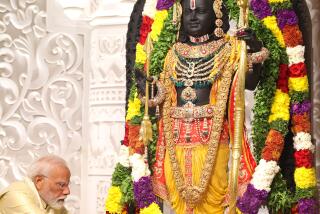Throngs in Capital Celebrate Nepal’s New Democracy : Asia: Hundreds of thousands cheer the king’s decision to legalize political parties. But the battle is far from won.
- Share via
KATMANDU, Nepal — Shouting “Long live democracy” and “Hang the old leaders,” hundreds of thousands of Nepalese exploded into the streets of the capital Monday in a spontaneous celebration of the victory of democracy over monarchy.
For the first time in more than 30 years of largely autocratic rule, tens of thousands of red political party flags, half of them bearing the Communist Party’s white hammer and sickle, appeared on the bicycles, rickshaws, buses, trucks, tractors, cars and scooters that jammed Katmandu’s festive streets throughout the day.
Hundreds of children marched with their mothers chanting and shouting their approval of King Birendra’s historic midnight announcement legalizing political parties. Civil servants, businessmen, doctors and street vendors in every neighborhood of the city left their offices and shops and jumped into the daylong processions.
Patients craned their heads out of hospital windows to watch. Farmers from outlying villages piled as many as 50 people on a single flag-draped tractor and drove in huge motorcades past the king’s downtown palace.
By the end of the day, nearly every face in the city was covered with thick layers of abir , the iridescent red paint that this overwhelmingly Hindu kingdom usually reserves for only its holiest of festivals.
It was by far the largest and most emotional public demonstration in recent Nepalese history. And it was strong evidence that the democratic wave sweeping the world has reached this remote mountain kingdom.
Not a single soldier was seen on the streets all day, the first time since Friday that the Nepalese capital was completely freed from 48 hours of curfew. Not once did a single riot police officer appear on the scene, and the day ended peacefully.
“We are liberated,” Krishna Prasad Bhatterai, acting president of the long-banned Nepali Congress Party, declared to more than 50,000 screaming supporters from the stage of Katmandu’s Open Theater, the same outdoor amphitheater that became a killing ground for riot police and troops during a similar rally last Friday.
“We have suffered a lot, but that is the nature of the struggle. And I assure you that the struggle is not over,” he said.
Far from it. Although the king’s announcement legalizing political parties for the first time since his father outlawed them 30 years ago met the principal demand of Nepal’s eight-week-old pro-democracy movement, he has said nothing about either general elections or dissolving his rubber-stamp Parliament.
Meeting with the press Monday evening, the king’s prime minister, Lokendra Bahadur Chand, gave no indication when elections might be held. He merely said that the king has appointed a commission to work with opposition leaders in drafting a constitutional amendment permitting polls.
Chand conceded that the king will have the final say but quickly added, “His majesty has made it clear as to which direction it will go--pluralistic democracy--and I think that is now clear.”
It was not, however, as clear to the majority of the Nepalese in the streets Monday. Although many praised the king’s decision to yield to the mushrooming populist movement, they added that they remain deeply suspicious of a dynasty that has perpetuated its power on and off for 2 1/2 centuries.
“Nobody expected that such a thing could happen overnight, and we are all very happy today,” said Dr. Ram Prasad Shrestha, a surgeon who had joined virtually every Katmandu professional in the movement’s series of demonstrations followed by bloody police crackdowns. “But there are mixed feelings about the king. Many think he did not go far enough. Some wonder whether he’ll actually go through with it. And others wonder whether this is all just a ploy to permit the political opposition to destroy itself from within.”
The movement was sponsored by an unlikely alliance between the nation’s seven Communist parties and the centrist Congress Party, which ruled the country for 10 years during its only other brief democratic experiment in the 1950s. Most analysts here expect the parties to begin fighting each other as soon as the political process moves forward.
There was a strong indication of that at one of Katmandu’s teeming intersections Monday. Two young men were marching hand-in-hand, one holding a Congress flag, the other a Communist flag.
“It is a great day for Nepal,” one of them said.
“It is a great day for democracy,” the other added.
Asked whether their two parties will begin fighting each other soon, the Communist replied: “Oh yes, some will be fighting, but that is still a long way off. We’ve only won round one.”
At the Open Theater, a primary schoolteacher was more specific.
“Today, we do not have a constitutional monarchy yet,” he said, asking not to be identified by name. “Only the ban on parties is lifted.
“The king has given nothing away. He still has all the power, and this is not enough for us. The overwhelming majority no longer has faith in the king. We are happy, of course, but we are not happy enough.”
On stage, there was further evidence of just how low the king’s image has sunk during the eight weeks that his police and army have shot and killed scores of unarmed demonstrators.
“The king is next,” Bhatterai declared to the whoops and cheers of the massive crowd.
When another Congress leader, Girya Prasad Koirala, declared, “This is not only a victory for the people, it is a victory for the king and the Panchayat (the rubber-stamp Parliament),” those in the crowd shot to their feet, verbally abused him for several minutes and shouted him off the stage.
The reaction brought the party’s ailing, 75-year-old supreme leader, Ganesh Man Singh, to his feet.
“Yesterday we got democracy, but today you are showing anarchy,” he told the crowd, which several times seemed on the verge of losing control. “Democracy means everybody should be allowed to speak. You must hear everyone out before you judge.”
There were other signs that Katmandu’s long-repressed anger still threatens to touch off another round of far more violent demonstrations if the king stops short of popular expections.
Throughout the day, there was a loud and sometimes vicious call for revenge against leaders of the appointed, hard-line Cabinet that the king was forced to dismiss last Friday.
“Marich Man, Marich Man, hang him, hang him,” the crowds shouted, demanding that former Prime Minister Marich Man Singh Shrestha be prosecuted for ordering the police to open fire on protesters.
More to Read
Sign up for Essential California
The most important California stories and recommendations in your inbox every morning.
You may occasionally receive promotional content from the Los Angeles Times.













